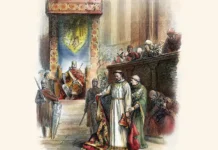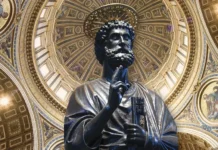In the Reign of Mary, a society admirably surpassing everything we can imagine will appear, like new wine. Through the supplications of the Queen of Heaven and earth, it will be like a lily born in the mud, amid the tempest.
At the beginning of the twentieth century, when the outline of a world emerging from the Allied victory of the First World War was just beginning to be traced out in timid strokes, one of the most significant episodes in contemporary history took place: the Mother of God appeared and brought a Message to humanity.
This Message entered upon the scene at a crucial moment. Impiety and impurity was spreading across the globe to such an extent, that to awaken men, a veritable hecatomb − the Great War − had struck, as the Most Holy Virgin affirmed to the little shepherd children. Nevertheless, the conflagration would end a short time after her apparitions, giving sinners an opportunity to amend their lives.
Therefore, at the Cova da Iria Our Lady called attention to a prodigious crisis in society, which, at heart, was the consequence of a religious crisis, and which would lead to a catastrophe that was much more moral than political. It would be a scourge for humanity, if the latter did not heed the voice of the Queen of prophets. And, in this case, other evils would follow: wars and persecutions of the Church and the Pope, martyrs; several nations would be annihilated. Thus, Our Lady indicated the scope of a calamity that would attain worldwide proportions, but at the end of which her Immaculate Heart would triumph.
The moral crisis continues to worsen
Despite the very clear warning of Our Lady, the moral crisis, from 1917 to our days, has only worsened. The fashions, the laws and customs increasingly and more blatantly defend crime, sin and aversion to the Law of God, fruits of a secular and materialistic culture. A complete inversion of values is being established, an order of things which facilitates vice and inhibits the practice of virtue. And the main reason for this profound crisis is, undoubtedly, the abandonment of the Faith.
Humanity no longer lives turned toward its Creator, but rather toward itself. It has forgotten that its end on this earth is to love God and to attain the salvation of souls. In face of such a dramatic scenario, how can one not expect that a regenerating intervention will befall the world? How could God ignore the terrible crisis in which the world is immersed, due to humanity’s wickedness?

A societal change in the direction of true conversion is becoming more improbable. And to the degree that we march toward the climax of moral degradation, the realization of the punishments prophesied by Our Lady become more likely. This being the case, we can only turn our gaze toward a light that shines on the horizon of current events, and which invites us to confide in the promise She made one hundred years ago: “In the end, my Immaculate Heart will triumph.” 1
The triumph of the Immaculate Heart of Mary will truly be the Reign of Mary; that is, the zenith of history, when the most Precious Blood of Christ, poured out for our redemption, will produce its best fruits.
St. Louis-Marie Grignion de Montfort and the Reign of Mary
But why a Reign of Our Lady?
Because “it was through the Blessed Virgin Mary that Jesus Christ came into the world, and it is also through Her that He must reign in the world,” 2 the great Mariologist St. Louis-Marie Grignion de Montfort teaches in his Treatise of True Devotion to Mary.
Nevertheless, one might ask: if Jesus Christ Himself said to Pilate that His Kingdom was not of this world (cf. Jn 18:36), how to explain that He will reign through His Most Holy Mother here on earth? Might not St. Louis Grignion be referring to the reign of Our Lady in eternity, at the end of time? Or to her title as Queen of Heaven and earth, which She received immediately upon ascending into Heaven and being crowned by the Blessed Trinity?
No. What St. Louis Grignion affirms, when he speaks of the temporal kingdom of Mary, is that She will in fact be Queen of men and exercise an effective government over humanity. In this epoch, he says, “souls [will] breathe Mary as the body breathes air.” 3 It will be a new historical era, in which grace will dwell in the heart of the majority of men, and they will be docile to the action of the Holy Spirit, through devotion to Mary: “wonderful things will happen on earth. The Holy Spirit, finding His dear Spouse present again in souls, will come down into them with great power. He will fill them with His gifts, especially wisdom, by which they will produce wonders of grace.” 4 It will be a time of joy, an “age of Mary, when many souls, chosen by Mary and given Her by the most High God, will hide themselves completely in the depths of her soul, becoming living copies of Her, loving and glorifying Jesus.” 5

Nevertheless, how will all of this be accomplished, in view of the deplorable state of the world? We even have trouble imaging an era in which virtue and the desire for holiness will prevail among men…
It is, once again, St. Louis Grignion de Montfort who explains how this marvel will take place, in one of the most admirable prayers yet composed by anyone, his Fiery Prayer: “The Reign especially attributed to God the Father lasted until the flood and ended in a deluge of water. The Reign of Jesus Christ ended in a deluge of blood, but Thy Reign, Spirit of the Father and the Son, is still unended and will come to a close with a deluge of fire, love and justice.” 6
A rain of the Holy Spirit’s enkindling fire must fall upon the earth transforming souls, just as happened with the Apostles (cf. Acts 2:3), gathered in the Cenacle with Mary Most Holy after the Ascension of Jesus (cf. Acts 1:14), at the very beginning of the nascent Church. From fainthearted cowards at the time of the Passion of Our Lord, they were transformed into heroes of the Faith, fearless and ready for anything, to go throughout the world preaching “the Gospel to the whole creation” (Mk 16:15).
We may thus say, with St. Louis de Montfort, that the life of the Church is a prolonged Pentecost, in which the Reign of the Holy Spirit succeeds the Reign of Christ, just as the latter succeeded the Reign of God the Father. And in this Reign foreseen by him, temporal society will so increase in dignity that men, although still living in this land of exile, will resemble the inhabitants of Heaven.
Mary: Queen in the most exalted sense
The reality of the facts demonstrates that modern society is like an edifice in ruins, especially compared to the time when “States were governed by the philosophy of the Gospel,” 7 in the words of Leo XIII in his Encyclical Immortale Dei. Nonetheless, the restoration of these ruins will certainly be glorious, for the Reign of Mary will be the plenitude of the Reign of Our Lord Jesus Christ. Indeed, devotion to Our Lady is the devotion to the mercy and love of Our Lord taken to the highest degree of perfection.
However, it will not only be a time in which the philosophy of the Gospel will govern the peoples; going still further, it will be the edification of the City of God described by St. Augustine, 8 in which culture, civilization, State and family, in short, all the elements which constitute life in this world will live for the love of God.
St. Bernard expresses so beautifully that Our Lady, being “Queen of Heaven, is merciful. And, above all, She is the Mother of the Only-begotten Son of God. Nothing can more effectively convince us of the grandeur of her power or her piety, than the fact that no one can doubt the honour that the Son of God renders to His Mother.” 9
This new historical era will, then, be rightly called the Reign of Mary, precisely because the graces that the Church will receive will come by means of Her, the Mediatrix of all graces. And it will even be necessary for devotion to Our Lady to be complete, as She declared in Fatima to be God’s wish, 10 in order for the triumph of her Immaculate Heart to come about. Now, when devotion to Her is complete, it is because She reigns and is Queen in the most exalted sense; therefore, it is the Reign of Mary.
Consequently, the Reign of Mary will be the glory of God, of His Most Holy Mother and of the Holy Catholic Church; that is, it will be such a resplendence of the light of virtue that it will surpass in its dominion what darkness has attained in our days: “where sin increased, grace abounded all the more” (Rom 5:20). It must contain within it reparation for all the evil practised in the past, and especially in our days, so that the will of God may at last be done on this earth as it is in Heaven.
Plenitude and perfection of the Church
In the Message of Fatima, then, it is clear that the coming of the Reign of Mary is something irreversible. But not only this, the Most Holy Virgin’s rule will bring with it a new plenitude and perfection to the Church, for the punishment will be followed by mercy: the Reign of Mary will arrive by an act clemency of Our Lady, since to affirm “my Immaculate Heart will triumph” is to say that the mercy and goodness of Our Lady will triumph. After obtaining for the world a regenerating chastisement, She will lavish it with gifts. Accordingly, the Reign of Mary will be a great reconciliation, which is indispensable in order for the Church to attain the perfection to which it is called.
It would have been contrary to the plans of Providence if Our Lord had not attained the plenitude of His physical, moral and intellectual development in His most holy humanity, before dying on the Cross, for He could not have come into the world without finishing His course, without reaching His perfection, as He did.

Beginning from the principle that everything said about Our Lord can and should be applied to His Mystical Body, it would also not be in accordance with the plans of Providence for the world to end without the Church attaining the perfection to which it was called. Now, in no past historical epoch after Christ has she arrived at the apex of her perfection; therefore, that perfection is yet to come and nothing can impede it.
For this reason, the desire of the coming of the Reign of Mary should be present in the soul of every Catholic, like a breath of grace, a conviction placed in the soul by the action of the Holy Spirit, for one who loses this hope is like someone from whose heart the love of God has vanished.
An inexorable law of history
Considering everything that has been analysed, it cannot be denied that the world finds itself in an unprecedented crisis, denounced by the Mother of God herself in Fatima. This crisis, whose ambit of action is man himself, whether in the moral, religious or social field, is marching toward its tragic end. In face of such a dramatic scenario, we would be tempted to think there is no solution to the problem, if we did not recall the affirmation of the Apostle: “I can do all things in Him who strengthens me” (Phil 4:13).
In this sense, if we observe the course of history, we see countless times in which the number of faithful was reduced to a remnant which, strengthened by grace, raised the standard of truth and orthodoxy. This can even be verified in Sacred Scripture, which reveal numerous occasions in which God resurrected the good from a handful of faithful. In fact, well known is the mysterious name Isaiah gave to his first son, a name of prophetic character: “Shearjashub” (Is 7:3), which means a remnant shall return.

It is as if God had planned to lead humanity in a certain direction, but when the latter deviated, He drew up a new plan, choosing for His instruments the few faithful who remained, giving rise to something even better.
If we analyse Sacred History, we see that after the fall of Adam and his consequent expulsion from Paradise, so many sins ensued among men that a divine chastisement was needed to destroy everything: the flood. Nevertheless, God set apart a remnant: Noah and his family. And, after establishing a covenant with him, the earth is once again populated.
The deviation of humanity in the building of the Tower of Babel was like a second original sin. From this resulted another divine chastisement: the dispersion of the peoples and the confusion of tongues. Once again, God calls upon a righteous man, Abraham, to be the father of a people chosen by Him, and with Abraham He makes a new covenant, initiating a patriarchal era among His elect. These episodes confer a unique beauty upon history.
And the process begins anew with a greater marvel: the promise that from this people the Messiah will be born of a Virgin who will conceive and give birth to the Son of God (cf. Is 7:14). Notwithstanding, the chosen and beloved people of the Most High repeatedly break this covenant, revolt against their Creator and sink continually into decadence, until “the time had fully come” (Gal 4:4), when the birth of the Messiah took place. Yes, of the Messiah who was handed over by His own people to be slain, to be put to “death on a Cross” (Phil 2:8)!
Once again the divine plan seems to be foiled, for God metes out His justice and disperses the Hebrew people, but He uses a remnant of the faithful of this beloved Israel to found His Church, which spreads the good odour of the Gospel throughout the earth, and a new divine victory is established. However, with the decadence of the Middle Ages the good began to weaken, despite some attempts at resurgence, and we arrive at our days in an apparent defeat of the good.

The best wine comes last
Thus, if God worked such extraordinary things in the past, He will certainly do so in future times, and even greater things. And giving an interpretation of supernatural character to this entire historical perspective, we may affirm that after being often defeated and crushed, the good will rise up again with renewed vigour.
Now, someone might object, asking: how can it be proven that the Reign of Mary is irreversible? With the logic of faith, we reply that evil has to reach its climax, as the prodigal son of the Gospel reached the point of eating the pods of the swine (cf. Lk 15:11-20), in order for society to come to its senses and return its paternal home – to the truth of the Faith.
The same Gospel further teaches us that “unless a grain of wheat falls into the earth and dies, it remains alone; but if it dies, it bears much fruit” (Jn 12:24). There is, then, a mysterious dynamism of Divine Providence, by which the fruit must rot and die so that the seed may be liberated. Analogously, the cycle of decadence of the modern world must reach its end and destroy itself, as the disease that disappears when it causes the death of its victim.
Furthermore, it was Mary Most Holy who, at the Wedding of Cana obtained from Our Lord the miracle of the transformation of water into wine. The wedding steward remarked to the bridegroom that he had saved the best wine for last (cf. Jn 2:9-10); we, for our part, could well exclaim, full of wonder and gratitude to Our Lord: “Thou hast saved the best of Thy graces, Thou hast saved the best of Thy blessings for the end of the history of the world.”
The Wedding of Cana, the first of the signs performed by Jesus at the supplication of His Mother, is the most clear prefigure of the Reign of Mary. In it a new wine will emerge, a society admirably surpassing everything that we can imagine. To use a beautiful metaphor of Dr. Plinio, it will be like “a lily born in the mud, during the night, amid the tempest,” 11 also at the supplication of the Queen of Heaven and earth. ◊
Transcription, with adaptations, from the book: CLÁ DIAS, EP, João Scognamiglio.
“In the end, my Immaculate Heart will triumph!” São Paulo: Lumen Sapientiæ, 2017








Reading this for the first time in 2024, the day that Notre Dame Cathedral will host its first Holy Mass after having been reconsecrated with a ‘remnant’ of dignitaries from all over the world in attendance, on the seeming precipice of WWIII, and what could easily be described as a miraculous U.S. presidential election. Writing this after 2019’s Covid, the lockdowns, massive church closure schemes being executed by bishops the United States over. Writing this after being drawn 4 years closer to a total Marxist takeover of the U.S. by the Biden Administration. Now, on the other side of these things, at the close of 2024, Christmas and Hanukkah align, and we await a Jubilee Year of the Lord’s favor. The Consecration of Notre Dame looked almost like Tolkien’s Council of Elrond, with consequential leaders (and interesting substitutes Trump for Biden, and Prince William for the King) from the world over gathering for their own purposes, with geopolitical meetings here and there, but there is a greater purpose that seems to be surfacing – the destruction of the Ring…and perhaps the dawning of the Reign of Mary.